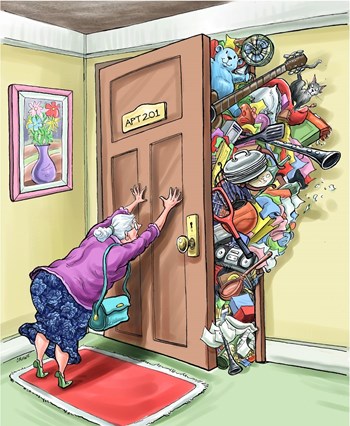I was listening to the soundtrack to the movie, 1492: Conquest of Paradise, the other day. It isn’t a great movie although it has a terrific score. It’s a telling of the story of Christopher Columbus and his discovery of North America. But I’m not reviewing that movie in this article. Instead, there’s a scene from the movie that I want to explore on how it relates to Jesus’ teachings and the Rosary.
Towards the end of the movie, after the Spaniards established a colony on an island in the Bahamas, a massive tropical storm hits and destroys nearly everything the settlers had built. Their grand church, houses, and other structures lay in ruins. Meanwhile, the natives, having been through such storms in the past, didn’t lose much given the simple structures that they could easily rebuild.
This scene demonstrates that the more stuff we surround ourselves with, the harder it becomes to part with it. The storm was a tragedy for Columbus and the settlers because they had invested so much time, energy, and other resources to bring the comforts they were used to into the new world. But the natives didn’t feel a huge sense of loss because they didn’t have a huge worldly investment for the storm to wipe away.

The Gospels are full of accounts of Jesus warning against the acquisition of worldly goods. He tells the rich man to give all that he has and follow Him (Matthew 19:16-24). He talks about the man who builds bigger barns to store his crops only to die the next day (Luke 12:13-21). Whether it’s the movie 1492 or the Gospel, the message is clear. The more stuff you acquire, the more attached you are to this world and the harder it will be to detach yourself from it. Eventually, it’s not you who owns stuff. Rather, more stuff masters over you. And with all that stuff in your life comes the worries of losing it or the pursuit to acquire more. Where is there room for God’s grace?
Now it’s not like I live a Spartan existence. Like many modern households, I surround myself with television, computers, smartphones, and other things. But I try my best to remember that they are just things. I try to keep the perspective that my life will actually be just as happy and fulfilling if those things went away (and maybe even happier). When I pray, I ask God for the strength to not let my possessions own me. That’s easier said than done, but that’s where daily Rosary prayer comes in.
When I think of detachment from worldly goods, I pray the Third Luminous Mystery — The Proclamation of the Kingdom of Heaven and the Call to Conversion. I remember that Jesus taught us that we should store Heavenly goods, not worldly ones. All the wealth and possessions in the world mean nothing if you don’t leave room for God’s grace. When I do find myself focusing too much on “stuff” I ask God to help convert that worldly focus to a Heavenly one.
Let’s face it, our pursuit of possessions is a form of greed, one of the seven deadly sins. The opposing virtue is charity. When I pray the Second Joyful Mystery, the Visitation, I think about Mary’s charitable act of helping her cousin, Elizabeth, in her pregnancy although she was pregnant as well. She made the effort to think beyond her needs and desires to help someone else. When we meditate on this Rosary mystery, let’s think about how we can be more charitable in our lives, not only with monetary donations but also with our time and talents. We ask Mary to help us counter our greedy vices with charitable virtues.

